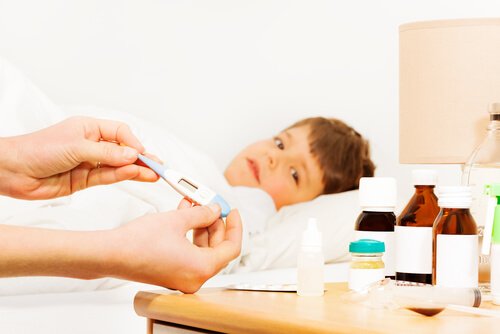Fever Phobia: Parents' Fear of Their Children Getting a Fever

Fever phobia, also known as febriphobia, is a persistent, unjustified fear that parents feel when they think their child’s fever could cause seizures, meningitis, or even death. Therefore, parents feel the need to quickly give their children medication that they don’t really need and take them to the pediatrician.
Parents should keep in mind that a fever is usually a natural response from the body to an illness. So, if they try to give their child medications without knowing what caused it, they could actually make the illness worse.
What do parents who suffer from fever phobia experience?
These parents usually feel very anxious. They think the fever is a symptom of a very serious illness. In addition, they think that if it’s above 103ºF, it’ll be very dangerous and greatly harm the child.
“A fever is usually a natural response from the body to an illness.”
Causes of fever phobia
Fever phobia in parents can be due to various things, including:
- In some cases, not knowing what the normal body temperature is.
- Thinking that all fevers, no matter what, are very bad and will always cause irreversible damage.
- Believing that if they give their child medicine, they’re helping control the disease.
- Thinking that if the fever doesn’t go away quickly, their child could have seizures or meningitis.

Effects fevers can have on children
The fear that parents feel can negatively affect their child’s wellbeing. Some of these effects are:
Worsen the child’s health
If you take more medicationsn than necessary, your kidneys will work harder to get rid of them. On the other hand, constantly taking the child to the emergency room can put them in a bad mood. They might assume that their situation is very serious.
Affect the child’s development
This usually happens when they’re very overprotected. This can prevent them from doing activities that kids normally do. Also, when you unnecessarily take care of your child by doing too much, they might feel isolated.
“If you take more medications than necessary, your kidneys will work harder to get rid of them.”
How can you avoid fever phobia?
Parents can prevent this fear of fevers in the following ways:
- Try not to believe in wrong ideas or information. This can cause you to act hastily and irrationally.
- Learn the signs and symptoms that could be a real risk. Don’t just focus on their temperature.
- Go to the pediatrician and ask any questions you may have.
Things parents should keep in mind
To avoid being concerned over things that don’t actually pose a risk, keep the following things in mind:
- Sometimes, children can suffer from seizures. However, this doesn’t mean that your child will suffer from epilepsy.
- Control your child’s temperature in other physical ways. You can use the thermometer, warm water cloths, and baths at a good temperature.
- Try not to give them unnecessary medications, like antipyretics or antibiotics.

- Don’t give your child homemade remedies recommended by other people if you haven’t tried them before. If you don’t know their effectiveness, it’s better to not use them. In addition, the way an adult’s body reacts is very different from how a child’s reacts.
- If the child is less than 3 months old, consider the fever as a reason to go see the doctor.
- If they’re older, pay attention to their temperature and watch the other symptoms that they show.
- Don’t rub them with alcohol. This could be very toxic for them.
In conclusion, fever phobia is an abnormal fear that your mind can create. Although it’s not bad to worry about your child when he has a fever, you need to know if he’s really sick or not.
Of course, you shouldn’t stop paying attention to your child. If you notice that his fever doesn’t go away on its own, go to your pediatrician immediately.
All cited sources were thoroughly reviewed by our team to ensure their quality, reliability, currency, and validity. The bibliography of this article was considered reliable and of academic or scientific accuracy.
- MORAGA, F., HORWITZ, B., & ROMERO, C. (2007). Fiebrefobia: conocimiento y actitud de los padres respecto de la fiebre. Revista chilena de pediatría, 78(2), 160-164. https://scielo.conicyt.cl/scielo.php?pid=S0370-41062007000200006&script=sci_arttext
- Razón Behar, R. (2011). Fiebrefobia. Revista Cubana de Pediatría, 83(4), 431-441. http://scielo.sld.cu/scielo.php?pid=S0034-75312011000400011&script=sci_arttext&tlng=en
- Zamora Zamora, F., & Zamora, L. Fiebrefobia en urgencias de pediatría. http://congresoenfermeria.es/libros/2014/salas/sala6/p_276.pdf
- Bauer Izquierdo, S., Díez Domíngo, J., Ballester Fernández, R., & Ballester Sanz, A. (2009). Persistencia de la fiebrefobia a pesar de la evidencia científica. Acta Pediátrica Española, 67(1), 38-39. https://medes.com/publication/47230
This text is provided for informational purposes only and does not replace consultation with a professional. If in doubt, consult your specialist.








